Those who disbelieve filled their hearts with fanatical rage-the fanatical rage of the Time of Ignorance-and God sent down serenity to His Messenger and to the believers, and bound them to the expression of heedfulness which they had most right to and were most entitled to. God has knowledge of all things.
(Quran, 48:26)
Commonly, romanticism is understood as romance or the Romantic movement of the nineteenth century, but besides these forms, romanticism is also closely related to certain political sentiments. Chief among them is "romantic nationalism," which appeared at the end of the nineteenth century, and exercised a great influence in the world until the middle of the twentieth.
First, it must be clearly stated that our criticism is not against nationalism per se, but against "romantic nationalism." There is a great deal of difference between the two.
Nationalism, in the most common sense of the term, refers to an individual's love for his people and for his country. This is a good and completely legitimate sentiment. Since it does not go against religion, it has no damaging effect for humanity. Just as an individual's love for his mother or father is a legitimate feeling, so also is love for the nation, that nurtured him in a common faith and culture, a legitimate feeling.
Nationalistic sentiments become illegitimate when they become irrational or overly passionate. If a person, out of love for his country, begins, without justification, to harbour feelings of hostility towards another nation, or tramples over the rights of other nations and peoples in the interests of his own-for example, if he seizes their land or confiscates their property-he has exceeded legitimate bounds. Or, when he lets his love for his nation turn into a kind of racism, that is, when he claims that his own nation is inherently superior to another, he has adopted an irrational outlook.
God draws our attention to this irrational nationalism in the Qu'ran. What is described in the following verses as "fanatical rage," is a characteristic feature of societies who are divorced from the religion.
Those who disbelieve filled their hearts with fanatical rage-the fanatical rage of the Time of Ignorance-and God sent down serenity to His Messenger and to the believers, and bound them to the expression of heedfulness which they had most right to and were most entitled to. God has knowledge of all things. (Quran, 48:26)
While the above verse speaks of "fanatical rage," it also speaks of the serenity that God bestows upon those who believe in Him. This juxtaposition points to the fact that if a person who loves his kindred, his clan or his community, harbours hatred or aggression towards others as a result of that love, his behaviour is errant. On the contrary, God desires His servants to enjoy peace, tranquillity and security; in other words, the spiritual state that God desires for His followers is one where reason is foremost.
"Fanatical rage" does not permit such a desirable condition to exist, but pits one group against another, based solely on differences in language, colour, tribe or clan.
God described this "fanatical rage" already 1400 years ago in the Qu'ran, and today it is still possible to witness its effects in every part of the world. There are people in Africa who strangle others to death just because they belong to a different tribe. In Europe, a football match deteriorates into armed combat when "hooligans" beat fans of the opposing team almost to death, just because they belong to the opposing side. In the Western world, there are organisations whose sole purpose is to foster hatred against Africans, Jews, Turks and other minorities, even to the extent of making them targets of terrorist assaults.
The influence of "fanatical rage" pervades not only the lowest classes, but also the highest echelons of some societies. There are many countries that exploit the matter of a simple border dispute as an excuse to carry out open acts of aggression. To satisfy their belligerent tendencies, they throw their countries into a war, persisting stubbornly in their aggression for years, plunging not only the citizens of the enemy country, but even their own people into misery. Those authorities who make such decisions are afflicted with what we are referring to as "fanatical rage." As explained in the above quoted verse, he who "fills his heart with fanatical rage" lives in ignorance.
Among these ignoramuses are also they who instigated the two greatest calamities of the twentieth century: the First and Second World Wars. Moved by such false notions as "German heroism," "English pride" and "Russian courage," they subjected their own people, as well as the whole world, to great suffering, spilling the blood of 65 million people, and leaving tens of millions crippled, widowed and orphaned.
The root cause of these calamities was "fanatical rage." We are now referring to it as "romantic nationalism."
Nationalism as an idea spread throughout Europe in the 18th century. Prior to that, people lived under the power of many feudal lords. Then, they came together under a single nation-state governed by a central administration. European countries such as France and England were among the first to espouse the notion of nationalism and to become a nation-state. By the 19th century, most of the nations of Europe had achieved national unity.
Only two countries did not participate in this development: Germany and Italy. In both these countries, the power of principalities or of small city-states lasted much longer. Italy achieved nationhood only in 1870, and Germany only a year later, in 1871. In other words, both these countries were later than other European countries in adopting and implementing the ideas of nationalism.
However, this particular situation was the cause of the development of a more radical brand of nationalism in these two countries than in the other countries of Europe. According to the widespread opinion of social scientists, the reason for the birth and accession to power in these two countries of the extreme forms of nationalism, Nazism and fascism, was the spread of fanatic nationalistic sentiments linked with the late formation of national unity.
In these two countries, and especially in Germany, those who promoted the idea of fanatic nationalism were known as "romantic nationalists." The basic features that characterise romantic nationalists are their exaltation of feeling to the detriment of reason, their belief that their nation is endowed with a mystical and mysterious "spirit," and that this spirit makes their nation superior to others. Towards the end of the 19th century, romantic nationalism was influenced by racist theories that were then gaining wide acceptance, and which led to the claim that European races were superior to the other races of the world, and therefore, had the right to rule them.
Romantic nationalism spread quickly, again, especially in Germany, during the first two decades of the 19th century. Writers such as Paul Lagarde and Julius Langbehn supported the idea of a kind of hierarchical world-order which Germans were to administer. They claimed this could be achieved due to the natural superiority of the "German spirit" and "German blood," and that, to this end, Germans must turn their backs on monotheistic religions, such as Christianity, and return to their pagan past.
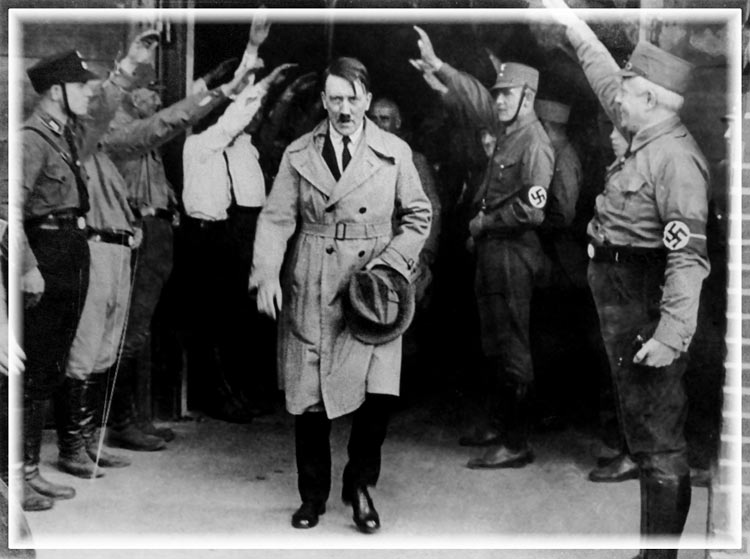 |
| The gravest example of "romantic nationalism" in the twentieth century was Hitler's Germany. This racist nationalism developed entirely through the influence of romantic idealism, and the oppression and misery to which it gave rise constitute a black stain on the history of the world. |
The growth of mystic (occult) societies in Germany played an important role in the spread of romantic nationalism during this period. The world-view shared by these societies was composed of several shallow ideas, such as these: human beings can attain truth not with their reason but through their feelings and intuitions; every country possesses a national "spirit;" the German national "spirit" is a pagan spirit. These societies prepared the ground for the rise of Hitler and Nazism. The English historian Michael Howard writes that "the rise of a pan-German nationalist movement which drew its spiritual strength from occultism and its ideology from the esoteric philosophies of the secret societies... formed ...the extreme racialist doctrines, which, in the 1920s, spawned National Socialism."1
Indeed, romantic nationalism's only contribution to humanity has been to have prepared the foundation for Nazism, one of history's most brutal and bloody regimes.
Because romantic nationalists believed they were to find truth through "feeling and intuition," and not through reason, they came to adopt a most confused view of the world, one which reflected their poor spiritual condition. The American professor of History, Gerhard Rempel, in his article entitled "Reform, Liberation and Romanticism in Prussia," describes the spiritual state of the romantic nationalists in the following words:
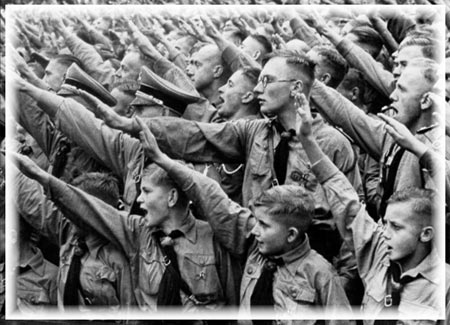 |
| In Nazi Germany, the masses were entranced under the influence of grandiose emotionalism, and they were easily deceived into acquiescing to the inhuman motivations of Nazism. |
Romanticists sought to escape into fantasy, sentimentality and allegory. Spiritually they toyed with death, with brooding, with the somber, opaque recesses of the night. Novalis [a pioneer of the early German Romantics] said: ''Life is a sickness of the spirit.'' What we have here is the beginning of aesthetic pessimism…. Romanticism uncovered the deeper irrational forces of the human spirit… Novalis believed that all worlds and ages could be united by the magic of imagination… Through the patriotic literature of the war of liberation this ''dance of the soul" reached the broad masses of the population...
The German Romanticists developed the cult of aestheticism which was at once a rejection of reason and an attempt to apprehend unity and immediacy in one instantaneous act. In this theory the poetical was the absolutely real. 2
 |
| Above: A propaganda poster from the Nazi era symbolising romantic nationalism, and extolling the German race and people with heightened sentimentality. |
The foundation of romantic nationalism was based on "feeling." This fanciful ideology produced individuals who were cut off from reality, lost in the confusion of their own minds. Romanticism, by enslaving people to their feelings, leads them to lose touch with reality, and in this manner, can be compared to the psychological disease of schizophrenia. (Those who suffer from schizophrenia are completely cut off from reality and live in a world created by their own imaginations.)
The disease of schizophrenia provides a poignant analogy of the spiritual condition of romantic nationalism, which is based on a number of errant ideas, chief among them being the notion of "blood" and "fatherland," which it then idolizes and turns into obsessions to be pursued blindly. In Germany, at the beginning of the twentieth century, the idea of "Blut and Boden" (Blood and Fatherland) gained momentum. According to this notion, German blood and the German fatherland were holy, and those minorities within the country that did not belong to the German race, were seen as polluting German blood and sullying the German fatherland. This current of thought exercised a great influence on the Nazi ideology, which viewed the spilling of blood as part of a holy crusade. In the course of an unsuccessful coup attempt in 1923, Hitler took a party flag stained with Nazi blood and virtually turned it into an idol of worship. This flag came to be known as "Blutfahne" (Blood Flag). It was preserved as it was and became the most holy symbol in all Nazi gatherings. Other, new flags were touched to it, so that it might transmit something of its "sacred" quality.3
The type of attitude that regards blood and bloodshed as holy has been the cause of the bloodiest conflicts seen in human history. The first and second World Wars were but clashes between romantic nationalists. The current of romantic nationalism was most clearly seen in Germany, but it also had its influence at the same period in English, French and Russian societies, where it was also responsible for drawing those countries into war. It fanned into flames those problems that could otherwise have been solved through diplomacy, and ultimately inflicted the world with the massacre of millions of human lives.
To understand the outcomes of romantic nationalism, it is useful to study the developments of First World War. Although many countries participated in that war, only few of them played a pivotal part. On one side were England, France and Russia; on the other, Germany and the Austro-Hungarian Empire. At the outset of the war, all generals shared a common strategy: through a forceful attack, the enemy lines could be divided and routed and within a few weeks, victory would be attained. However, the war brought victory to no one.
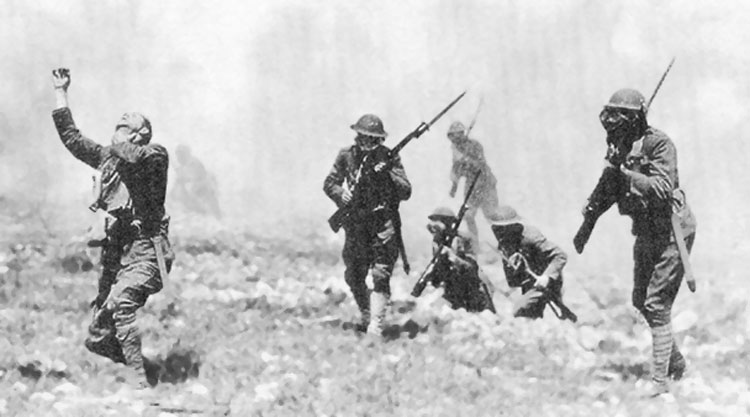 | |
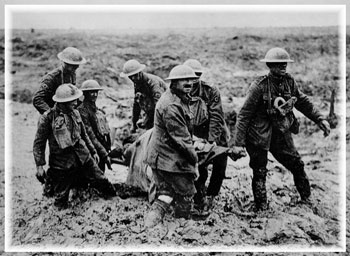 | 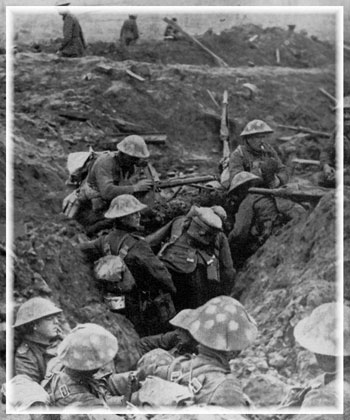 |
| Under the influence of romantic nationalism, people were provoked into world wars, whose only outcome was bloodshed, misery and tears. In the aftermath of those wars, millions were dead, widowed, orphaned, and thousands of cities ruined. | |
In 1914, Germany suddenly invaded France and Belgium. After an initial advance, forces were engaged in battle, the front-lines of assault were drawn up, and for almost three and a half years, no further ground was gained. Each side attacked the other repeatedly in the hope of dividing the opposing front, but the situation remained unchanged. In the famous Battle of Verdun, initiated by a German attack, a total of 315,000 French and 280,000 German soldiers died, but the front was moved back only a few kilometres. Months later, the English and French launched a counter-attack at the Battle of the Somme and, as a result of the bloody engagement, 600,000 Germans, more than 400,000 English, and about 200,000 French soldiers died. Nevertheless, the German front was driven back only 11 kilometres. With their enthusiasm enflamed by romantic marching songs, and through moving poetry extolling the "German spirit," "English honour" and "French valour," military strategists and tacticians finally made unwise decisions, causing the slaughter of their own people. Most of those soldiers who survived the three and a half years in the muddy trenches, without being able to even raise their heads because of the continual bombardment, also suffered psychologically as a result of their experiences.
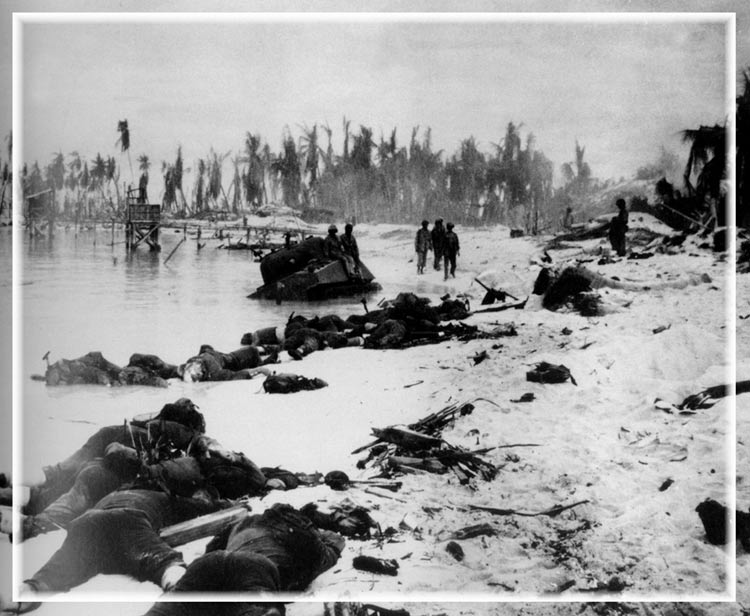 |
| In the wars which resulted from the emergence of romantic nationalism, the value of human life was nearly completely forgotten. Excited by such sentimental ideas as the "German spirit," "English honour" and "French valour," praised in romantic marching songs and poems, leaders made irrational decisions, sending their own people to slaughter. |
A terrible example of senseless bloodshed brought about by romantic nationalism in the First World War was the attack against German lines led by the French general Robert Nivelle in April 1917. Nivelle promised before the battle that, "within two days he would divide the German lines and within one week gain decisive victory." Although the German army was more advantageously positioned, the French army set out to honour this unreasonable promise, and attacked on April 16. An attack they had hoped would end in two days lasted more than one and a half months, without a result, other than the death of hundreds of thousands of soldiers, and finally, mutiny among the French troops.
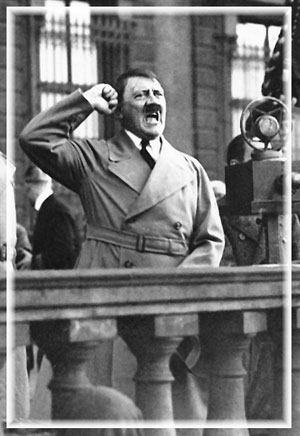 | 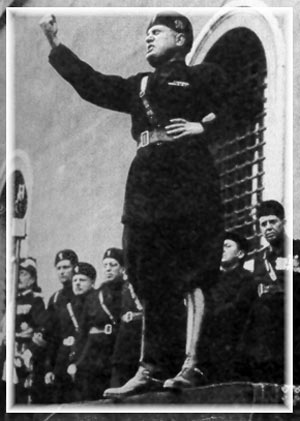 |
|
A mentality of bloodlust came into being in World War II. Because of the psychopathic passion of romantics like Hitler, Mussolini and Stalin, a total of fifty-five million people perished. These were the heartless protagonists of the Second World War, whose quest for utopian ideals led the whole world into oppression, cruelty and corruption. | 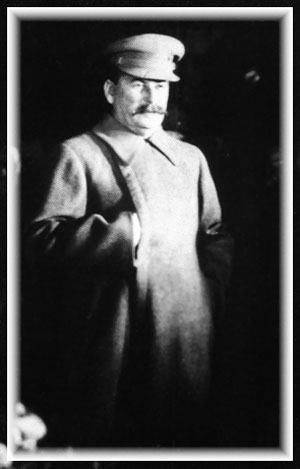 |
The same blood-lust mentality came to the fore again in World War II, but this time with even greater casualties. A total of 55 million people died as a result of the overweening ambition of psychopathic romantics such as Hitler, Mussolini and Stalin.
It is not only in global conflicts that romanticism plays a role; it also lies at the root of war and aggression between various countries, tribes and organisations. Without a clear understanding of the factors involved in the situation in which they were living, millions, influenced by emotional slogans, tales of heroism, stirring marching songs and poems, have taken up arms and shed, not only their own blood, but also the blood of those they considered to be the enemy, plunging with them the world into confusion and strife.
 |
| In the four corners of the world, people incited to savagery and violence by romanticism can subject others to unimaginable tortures, and commit various kinds of inhuman acts against them. |
At the beginning of this book, we pointed out that sentimentality is a weapon used by Satan to divert humanity from the way of God, and to lead them into misery. This trap that Satan has set for humanity is clearly evidenced in romantic nationalism. In the Qu'ran, God relates how Satan submits those under his influence to a state of terror, confusion and hostility:
He (God) said, "Go! And as for any who follow you, your repayment is Hell, repayment in full! Stir up any of them you can with your voice and rally against them your cavalry and your infantry and share with them in their children and their wealth and make them promises! The promise of Satan is nothing but delusion." (Quran, 17:63-64)
The above verse relates how Satan, using those individuals under his control, will "entice any of them whom he can with his voice" and "rally against them his cavalry and his infantry"-the means to provoke romantic nationalism.
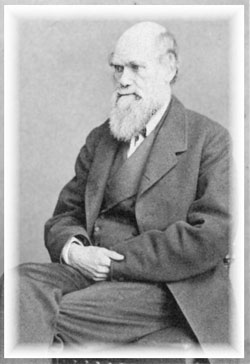 |
| Charles Darwin's theory brought misery upon misery to the world. |
Romantic nationalists have resorted to a few philosophical and so-called scientific revelations to help justify their penchant for the shedding blood. The basis of these revelations is Darwin's Theory of Evolution.
Darwin, an English biologist, wrote a book called The Origin of the Species which was published in 1859. In this book, he proposed that a merciless struggle occurs in nature and, according to whether or not they gain advantage in the struggle, living things develop and new species come into existence. In other words, according to Darwin, the key to development in nature is conflict. In another book, The Descent of Man, published in 1871, Darwin developed his ideas more cogently and proposed, moreover, that some races of humanity were more advanced relative to others, thus laying the foundations of scientific racism. Darwin regarded the white races of Europe as "advanced races," and considered Africans, Asians, and even Turks, as "primitive and half-ape."
With the spread of Darwin's theory, racism and militancy quickly gained support, to the point where they began to be perceived as "scientific fact."
The relationship between Darwinism and romantic nationalism should thus be clear: romantic nationalists founded their lust for conflict, and their obsession with the superiority of their own race over others, on Darwinism.
It is possible to recognise Darwinism's catastrophic influence at work in the extraordinary degree of bloodshed that took place during World War l. Without a moment's hesitation, German, French, English, Russian and Austrian generals sent hundreds of thousands of soldiers to their deaths, for nothing. They adhered to the Darwinian slogan that, "living things develop through conflict and races rise to pre-eminence through war." It was in accordance to this line of thought that they gave the command for war.
For example, the connection between war and the laws of natural conflict was upheld by Friedrich von Bernhardi, a First World War general. "War" declared Bernhardi "is a biological necessity"; it "is as necessary as the struggle of the elements of nature"; it "gives a biologically just decision, since its decisions rest on the very nature of things."4
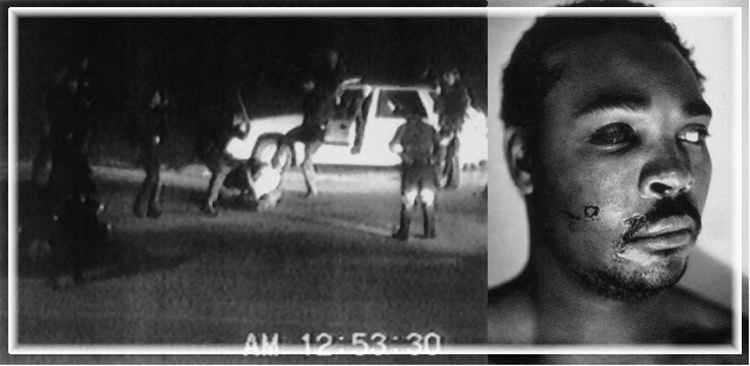 | |
 | 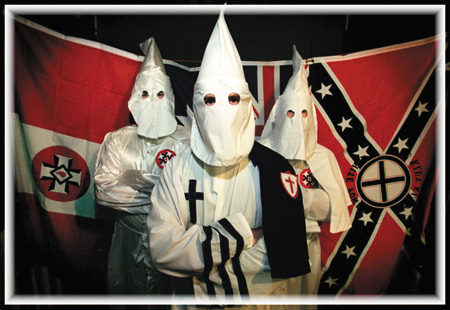 |
| Since the time of Darwin, racist attacks and related violence have increased. Today, we continue to find such twisted ideas in organisations such as the Neo- Nazis and the Ku Klux Klan, which target blacks and people of other races. It must not be forgotten, that the responsibility for all of these inhuman tendencies arises first and foremost from Social Darwinism. | |
The Commander-in-Chief of the Austro-Hungarian Empire, General Franz Baron Conrad von Hoetzendorff, wrote in his memoirs after the war:
Philanthropic religions, moral teachings and philosophical doctrines may certainly sometimes serve to weaken mankind's struggle for existence in its crudest form, but they will never succeed in removing it as a driving motive of the world… It is in accordance with this great principle that the catastrophe of the world war came about as the result of the motive forces in the lives of states and peoples, like a thunderstorm which must by its nature discharge itself.5
 |
| Another book by Gasman, seen above, treats the growth of Social Darwinism in Germany in more detail. |
German chancellor Theobald von Bethmann-Hollweg's advisor and close friend Kurt Riezler wrote in 1914:
Eternal and absolute enmity is fundamentally inherent in relations between peoples; and the hostility which we observe everywhere… is not the result of a perversion of human nature but is the essence of the world and the source of life itself.6
Romanticism encourages passionate affiliation between those of its own ranks, but incites anger and hatred against others. This is a spirit very much in accordance with the Darwinian concept of "the struggle for survival of the races." When applied in the social sciences, Darwin's theory is given the name of "Social Darwinism," and has been a major source of justification for romantic nationalism and racism. The American writer Janet Biehl, in her article entitled "Ecology and the Modernization of Fascism in the German Ultra Right," has this to say on this topic:
Social Darwinism has deep roots in the German ultra-right… Like Anglo-American social Darwinism, German social Darwinism projected human social institutions onto the nonhuman world as 'natural laws,' then invoked those 'laws' to justify the human social arrangements as 'natural.' It also applied the maxim 'survival of the fittest' to society. But where Anglo-American social Darwinism conceived the 'fittest' as the individual entrepreneur in a 'bloody tooth and claw' capitalist jungle, German social Darwinism overwhelmingly conceived the 'fittest' in terms of race. Thus, the 'fittest' race not only would but should survive, vanquishing all its competitors in its 'struggle for existence.'7
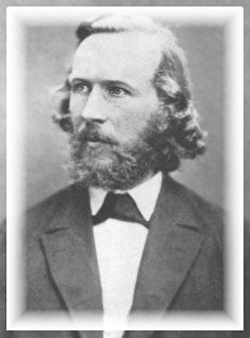 |
| Ernst Haeckel: Germany's foremost proponent of Social Darwinism. |
In Germany, the most important representative of Social Darwinism was the biologist Ernst Haeckel (1834-1919). He contributed to Darwinism by proposing the theory, summarised in "Ontogeny Recapitulates Phylogeny," that mammals replicate the process of evolution in their embryonic development. (Years later it was realized that this theory was unfounded and that Haeckel had even falsified his charts and diagrams.)
Haeckel founded the "Monist League," an association whose aim was the propagation of atheism, and which, at the same time, became a centre of racism and romantic nationalism. In the 1920's, the Nazi movement, which was then developing under the leadership of Hitler, was influenced by the ideas of Haeckel and the "Monist League." The historian Daniel Gasman, writing of these developments in The Scientific Origins of National Socialism: Social Darwinism in Ernst Haeckel and the German Monist League, said:
...[R]acially inspired social Darwinism in Germany… was almost completely indebted to Haeckel for its creation… His ideas served to unite into a full-bodied ideology the trends of racism, imperialism, romanticism, anti-Semitism and nationalism… It was Haeckel who brought the full weight of science down hard on the side of what were Volkism's essentially irrational and mystical ideas.8
Gasman also wrote:
It may be said that if Darwinism in England was an extension of laissez faire individualism projected from the social world to the natural world, [in Germany it was] a projection of German romanticism and philosophical idealism… The form which social Darwinism took in Germany was a pseudo-scientific religion of nature worship and nature-mysticism combined with notions of racism.9
In the same vein, Janet Biehl wrote that "Haeckel was also a believer in mystical racism and nationalism, so that German social Darwinism was from the beginning a political concept that lent romantic racism and nationalism a pseudo-biological basis." 10
All that we have discussed demonstrates once again that romanticism is a psychological disposition and a world-view that is completely outside the bounds of and inimical to religion. This is also clear in the sense that, Darwinism, which has been almost synonymous with atheism ever since it was first proposed, is implicit in romanticism.
 |
The relation of romantic nationalism to Darwinism, and its role in the rise of the Nazi movement, reveals yet another important fact: Romanticism is a highly pernicious influence for both the individual and for societies. Those caught up in it can be easily beguiled into a way of thinking that is completely contrary to reason, common sense, and right conscience. They may be led to believe, for example, that their own race is superior to all others, that they are justified in going to war, in invading and occupying much of the whole world, and that it is legitimate for them to annihilate or enslave other nations.
 |
Nazi Germany was the prime historical instance to demonstrate the destructiveness and cruelty of romantic nationalism. When the Nazis came to power in 1933, Hitler and his staff of generals undertook a campaign to "inculcate romantic sentiments," and within a short time, German society came to adopt the nonsensical assertions of romantic nationalism. At the end of the 1930's, the overwhelming majority of Germans came to believe that soon a "German Empire" (Third Reich) would be founded that would govern the whole world and last for a thousand years. In order to bring about their awaited destiny, they believed that the German race needed to be "purified" through the elimination of all minorities in the country. They also believed that Hitler was an unassailable and unconquerable "leader" (Führer), possessed of supernatural powers who would lead them to certain victory. Listening teary-eyed to Hitler's angry, belligerent, paranoid and discriminatory speeches, the masses were bewitched and lost all sense of reality.
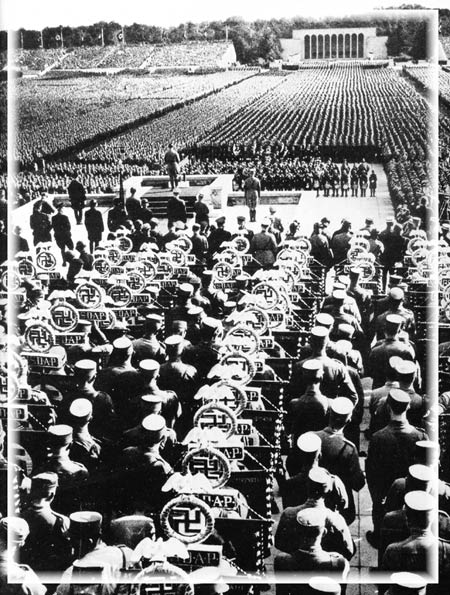 |
| The need was felt for distinct symbols to stir up romantic nationalist sentiments in the people; such as, the "German army," "German people," the "German flag," "German blood," etc... |
The famous Nazi Nuremberg rallies were a clear manifestation of "romantic brain washing." The American researchers Michael Baigent, Richard Leigh and Henry Lincoln, describe these meetings in these words:
The notorious Nuremberg rallies were not political rallies of the kind that occur in the West today but cunningly stage-managed theatre of the kind, for example, that formed an integral component of Greek religious festivals. Everything - the colours of the uniforms and flags, the placement of the spectators, the nocturnal hour, the use of spotlights and floodlights, the sense of timing - was precisely calculated. The film-clips depict people intoxicating themselves, chanting themselves into a state of rapture and ecstasy using the mantra 'Sieg Heil!' and doting on the Führer as if he were a deity. The faces of the crowd are stamped with a mindless beatitude… It is not a question of persuasive rhetoric. In fact, Hitler's rhetoric is quite unpersuasive. More often than not, it is banal, childish, repetitious, devoid of substance. But his delivery has a venomous energy, a rhythmic pulse to it as hypnotic as a drumbeat; and this, combined with the contagion of mass emotion, with the pressure of thousands of people packed together in a confined area… produces a mass hysteria… What one witnesses at Hitler's rallies is an 'alteration of consciousness' such as psychologists generally associate with a mystical experience. 11
More precisely, the Nazi meetings were mass-hypnosis sessions, which completely robbed people of their reasoning faculties, and put them under the spell of romanticism. Triggering the Second World War, this romantic hysteria cost the lives of 55 million people.
Nazism is merely one example of the destructive consequences of romanticism. Because romanticism robs people of their reason, and places them under the power of their emotions, it can lure them into every kind of perversion. For this reason, it is easy to mislead a romantic person. Under the appropriate conditions, and within just a short time, he can become a fervent racist or fascist. In another instance, however, he can become a communist militant, attack innocent people while chanting Leninist marching songs, or even lose sight of his senses to the point of setting himself on fire for what he comes to deem as a just cause. It is possible for a romantic to be cruel and harsh in one instant and sob emotionally in the next. There is no limit to the insanity that can result once wisdom is out of function, and one becomes a captive of his emotions-better to say, the irrational passions Satan provokes in him.
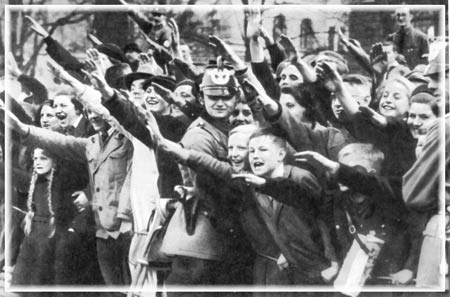 | 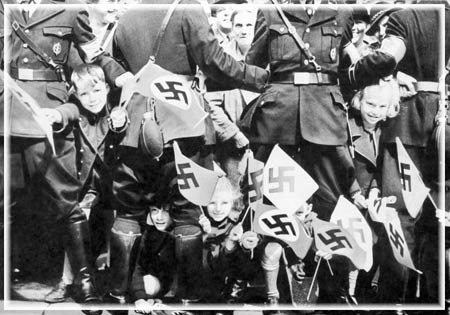 |
| People were captivated by emotionalism inspired by Satan. Spellbound, they listened to Hitler, and even applauded his inhuman deeds. The romanticism, which had reached such a degree of insanity, was also taught to children who were, in turn, diverted into the path of perversity. | |
1.Michael Howard, The Occult Conspiracy: The Secret History of Mystics, Templars, Masons and Occult Societies, Rider & Co Ltd, London, 1989, p. 106.
2.Gerhard Rempel, "Reform, Liberation and Romanticism in Prussia," http:://mars.wnec.edu/~grempel/courses/germany/lectures/07reform.html
3.Michael Baigent, Richard Leigh, Henry Lincoln, The Messianic Legacy, Corgi Books, London, 1991, p. 199.
4.M.F. Ashley-Montagu, Man in Process, World Pub. Co., New York, 1961, pp. 76-77; cited in Bolton Davidheiser, W E Lammers (ed) Scientific Studies in Special Creationism, 1971, p. 338-339.
5.Hoetzendorff, Aus Meiner Dienstzeit, IV, pp. 128-129; cited in James Joll, Europe Since 1870: An International History, Penguin Books, Middlesex, 1990, p. 164.
6.J.J. Ruedorffer (pseudonym for K. Riezler), Grundzüge der Weltpolitik in der Gegenwart, Stuttgart and Berlin, 1914, p. 23; cited in James Joll, Europe Since 1870: An International History, Penguin Books, Middlesex, 1990, p. 164.
7.Janet Biehl, "'Ecology' and the Modernization of Fascism in the German Ultra-right", Introduction to Ecofascism, Lessons From the German Experience, by Janet Biehl and Peter Staudenmaier, Ak Press, 1995, Scotland. 
8.Daniel Gasman, The Scientific Origins of National Socialism: Social Darwinism in Ernst Haeckel and the German Monist League, London, Macdonald & Co., 1971, pp. xxiii.
9.Daniel Gasman, The Scientific Origins of National Socialism: Social Darwinism in Ernst Haeckel and the German Monist League, London, Macdonald & Co., 1971, pp. xxii-xxiii.
10.Janet Biehl, "'Ecology' and the Modernization of Fascism in the German Ultra-right", Introduction to Ecofascism, Lessons From the German Experience, by Janet Biehl and Peter Staudenmaier, Ak Press, 1995, Scotland.
11.Michael Baigent, Richard Leigh, Henry Lincoln, The Messianic Legacy, Corgi Books, London, 1991, p. 199